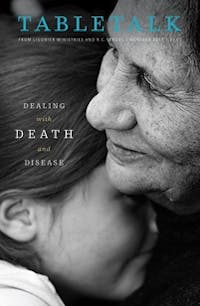
Request your free, three-month trial to Tabletalk magazine. You’ll receive the print issue monthly and gain immediate digital access to decades of archives. This trial is risk-free. No credit card required.
Try Tabletalk NowAlready receive Tabletalk magazine every month?
Verify your email address to gain unlimited access.
I was sixteen when my father died. It was a Sunday evening in late September of 1992 when I heard the news of his death. I had just returned from work when my mother came into my room in tears. My father was born in 1924, and his first son was killed in a hunting accident in 1969 at the age of eighteen. In 1986, my youngest sister was diagnosed with a disease that was projected to take her life by age 20. But despite these tragedies, my experiences are not altogether unique. Death and disease come to every family, and all of us have painful stories that daily weigh heavily on our hearts and minds. Our stories all have a similar theme because we are all sons of Adam, in whom we all died because we all sinned in him and fell into a state of sin and misery with him.
As a pastor, and having served now in some sort of ministerial capacity for sixteen years, I have witnessed many deaths and have held the hands of countless men and women and boys and girls who are themselves suffering from some sort of disease or dealing with the death or disease of a loved one. I dare not begin to count the number of teenagers, moms, and dads who have attempted or committed suicide, and I never seem to be able to forget the faces of those who have died as I knelt at their bedsides holding their hands.
Death and disease are a part of life. In one way or another, we are all faced with death and disease every day of our lives. Even though people today are isolated more than ever from real community and more insulated by a façade of creature comforts, we cannot escape the harsh realities of death and disease all around us. Every day we hear reports from other parts of the world about foreigners dealing with death and disease. Every day we hear about friends and colleagues trying desperately to cope with death and disease. Every day we ourselves consider the realities of death and disease that will eventually come to each of us and to each of our loved ones, if our Lord should tarry in His return.
Because of the unrelenting nature of death and disease, we might be tempted to try to run from death and hide from disease while striving with all our might never to think on such matters. But in doing so our striving would not only be vain but sinful. Just as the Puritans spoke of dying well, so we need to be reminded that it is not a question of if and when we will die, but how we will die and how we will cope with the daily realities of death and disease — will we stand and shake our fists at God in bitter anger or will we kneel in prayer and in humble dependence on our Lord and on the promises of the gospel of Jesus Christ by the sustaining power of the Holy Spirit, glorifying God and enjoying Him now and at the hour of our death? For the Lord gives, and the Lord takes away — blessed be the name of the Lord (Job 1).
